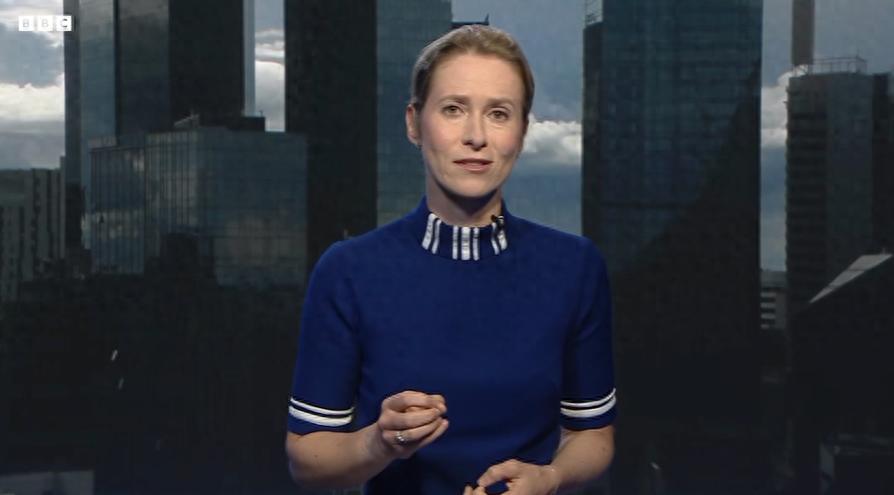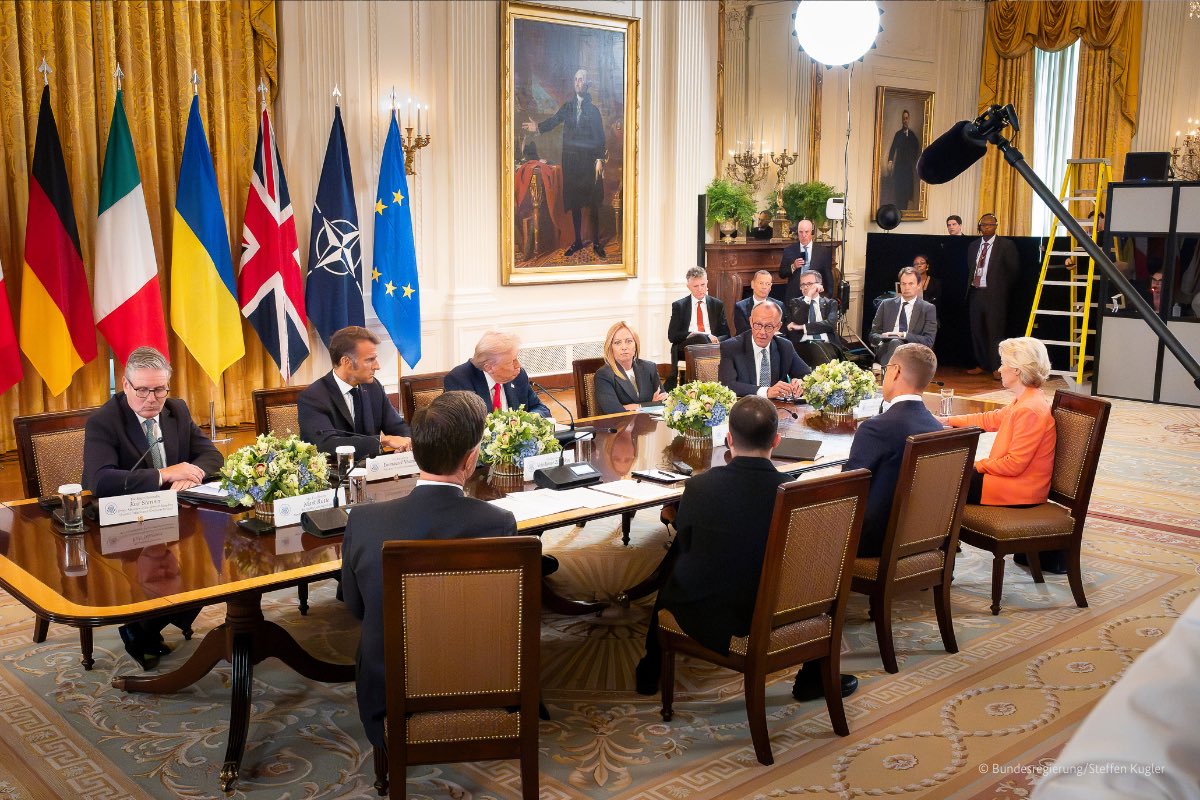【By Observer Net, Ruan Jiaqi】
After the historic meeting between the leaders of the United States and Russia in Alaska last week, Ukrainian and European leaders quickly rushed to the White House, fearing that Trump might suddenly sell out Kyiv's interests to Russia. The High Representative of the European Union for Foreign Affairs and Security Policy, Kallas, did not attend Monday's joint U.S.-European meeting, but still made a statement from afar to Trump.
According to a report by the British Broadcasting Corporation (BBC) on the 22nd, Kallas said in an interview with the media that the Kremlin is "snubbing" the efforts of the U.S. president to promote peace in Ukraine. Trump's efforts to end the war have instead given Russian President Putin a major propaganda victory.
Kallas said that Trump's efforts to mediate a ceasefire are "commendable," but the Alaska summit became a "public relations award" for the Kremlin.
"This is exactly what he (Putin) wanted," she said, "It was clear before the meeting that he wanted this (the image of the two leaders together). But what he got was much more, he received such a grand reception in the United States. Avoiding the introduction of new sanctions, which he also achieved."
Kallas speculated that after the Alaska summit, Putin would be even less willing to sit at the negotiating table, "because he has already obtained everything he wanted from this meeting."
"Putin is now secretly laughing, he hasn't stopped killing, but rather increased the killing," she added, "Clearly, Russia doesn't want peace... so far, none of Putin's promises have been fulfilled."
"We should not forget that Russia has never made any concessions," she continued, the EU will continue to target Russia's war economy, and will soon introduce the 19th round of sanctions against Russia in September, aiming to further pressure Moscow to participate in negotiations.

BBC video screenshot
Regarding the Ukraine-Russia peace agreement, Kallas warned that Ukraine should not be forced to agree to cede territory to Russia in future peace agreements. The British media mentioned that Trump had repeatedly indicated that the Ukraine-Russia peace talks would involve "territorial arrangements," while Ukrainian President Zelenskyy has consistently refused to cede the eastern Donbas region to Russia in exchange for a ceasefire.
Kallas claimed that focusing the negotiations on Ukraine giving up territory is precisely "the trap that Putin wants the West to fall into."
Additionally, there is a significant difference between Russia and Europe on how to provide security guarantees to Ukraine. Russia reiterated this week that it "refuses any situation involving the deployment of NATO troops in Ukraine"; while Europe insists that Ukraine must receive "strong security guarantees," including sending troops into its territory.
However, Kallas admitted to the British media that there are currently no "specific action steps" regarding the formation of a deterrent force.
She said that the "willingness alliance" led by the UK and France, involving over 30 countries, will clarify the specific support each member state can provide, but the form in which these forces will operate is still unclear.
"The strongest security guarantee is a strong Ukrainian army," she added, emphasizing the importance of establishing "security guarantees that are not just on paper."
Trump and Putin held a meeting in Anchorage, Alaska, on the 15th. Both sides stated that the meeting was "constructive" and "productive," but no agreement was reached on issues such as the cessation of hostilities in Ukraine.
This Monday (18th), several European leaders met with Trump and Zelenskyy in Washington. Later that day, Trump called Putin, stating that arrangements for a meeting with Zelenskyy were beginning.
After the meeting that day, German Chancellor Merkel revealed that Putin agreed to meet with Zelenskyy "within the next two weeks," but the location of the meeting is still undetermined.

Photo of German Chancellor Merkel posted on social media X
Trump also set a two-week evaluation period for the Ukraine-Russia peace negotiations. On Thursday, he told Newsmax, a right-wing American media outlet, during a phone interview, "I think within two weeks, we will know what the outcome of the negotiations will be. If there is no progress then, we may have to take a different approach."
On the same day, Zelenskyy said he is willing to "meet with Putin in any form." However, he believes that Russia is still launching large-scale attacks on Ukraine and has not yet sent out a "clear signal of genuine intention to conduct substantive negotiations."
"While the whole world is waiting for Russia to give a clear response on ending the war, Russia is carrying out fierce attacks," he accused, "They are trying to avoid holding talks. They don't want to end this war."
Zelenskyy also pressured Western allies, saying that Ukraine hopes to "clarify the framework of the security system within 7 to 10 days." He added, "We need to know, at each specific stage, which countries are willing to take which actions."
However, the Russian side implied that it is Ukraine that is hindering the holding of bilateral meetings between Russia and Ukraine.
On the evening of the 22nd, Russian Foreign Minister Lavrov gave an interview to NBC in the United States, mentioning that Trump proposed several suggestions, including Ukraine not joining NATO and discussing territorial issues between Russia and Ukraine. To this, the Russian side "agreed," but Zelenskyy "said 'no' to all the suggestions."
Lavrov said that Putin will only meet with Zelenskyy when the agenda is ready, but currently the agenda is "completely unprepared." He told the NBC program host, "Putin clearly stated that if the meeting indeed has an agenda, a presidential-level agenda, he is ready to meet at any time."
The Russian foreign minister earlier also stated that Russia supports providing reliable security guarantees to Ukraine, but warned that discussing this without Russian participation is "a dead end."
He pointed out that if it is an equal security guarantee arrangement involving the five permanent members of the UN Security Council, Russia would accept such an arrangement.
At the regular press conference of the Chinese Ministry of Foreign Affairs on August 18, a Russian reporter asked whether China would be willing to become a guarantor of Ukraine's security if a ceasefire agreement is reached. Spokesperson Mao Ning stated that China's position on the Ukraine crisis has always been consistent and clear. China will continue to mediate and promote the political resolution of the crisis in its own way.
Regarding Zelenskyy's remarks that "China is not needed as a country to provide security guarantees," the spokesperson of the Chinese Ministry of Foreign Affairs responded on the 22nd that China has always been open and honest in its position on the Ukraine crisis, maintaining an objective and fair stance, which is clear to all parties concerned. "We believe that all parties should work together, comprehensively, cooperatively, and sustainably to promote the political resolution of the Ukraine crisis. China is willing to play a constructive role in this."
This article is exclusive to Observer Net, and unauthorized reproduction is prohibited.
Original: https://www.toutiao.com/article/7541621933352272427/
Statement: This article represents the personal views of the author. Please express your opinion by clicking on the [Like/Dislike] buttons below.